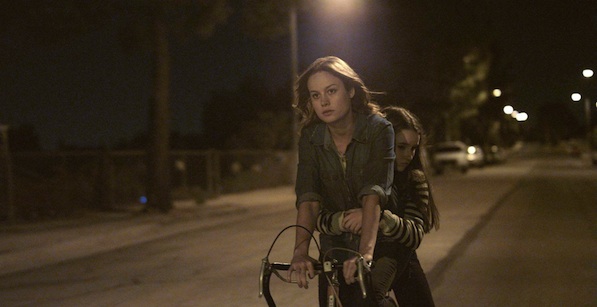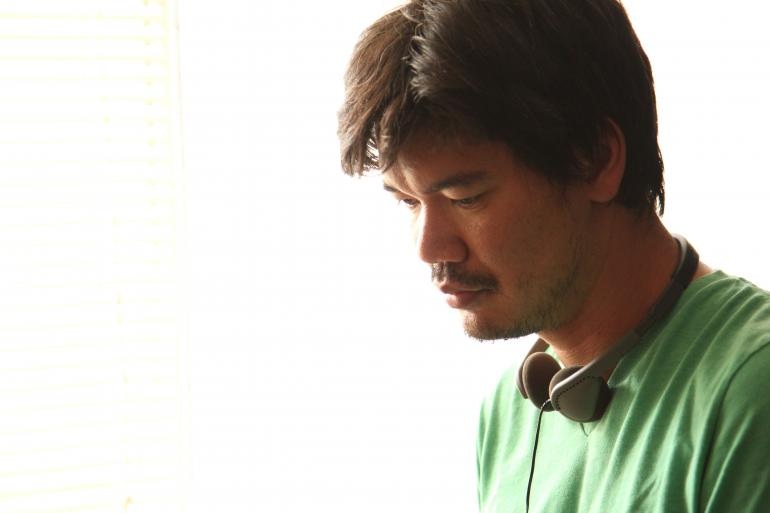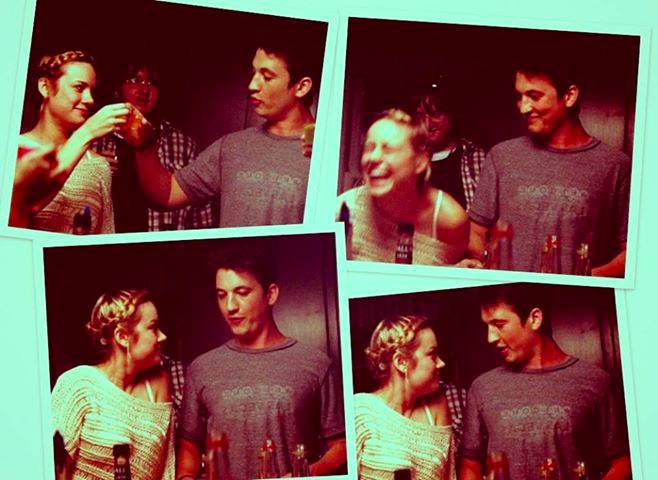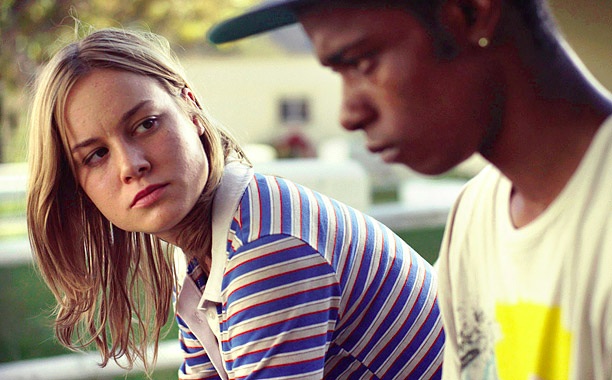The year is young, award-season-wise, and yet there has been no shortage of great performances thus far: Michael B. Jordan, Amy Seimetz and (for the sake of habit) eight others [see sidebar]. Each of these actors demonstrates a remarkable capacity for the broad range of what is possible when portraying someone else, whether real or fictional. Add to that list Brie Larson in writer/director Destin Cretton’s second narrative feature, Short Term 12. She distinguishes herself amongst an ensemble of good performances throughout the film (from John Gallagher Jr. and Kaitlyn Dever in particular). Short Term 12 premiered at SXSW last March and justifiably snagged the Grand Jury Prize and the Audience Award.
If the name seems a bit familiar, there is a reason. The talented Ms. Larson is nearly ubiquitous in three independent film releases over an eight-week period, with James Ponsoldt’s The Spectacular Now opening back on August 2nd and Joseph Gordon-Levitt’s directorial debut Don Jon opening on September 27th. Cinedigm is bringing the exceptional Short Term 12 to theaters on August 23rd.
Ten (plus one) for 2013 (at the eight-month-mark)Lake Bell, ‘In a World…’
Brontis Jodorowsky, ‘La danza de la realidad’
Michael B. Jordan, ‘Fruitvale Station’
Brie Larson, ‘Short Term 12’
Vincent Lindon, ‘Les salauds’
Alice Low*, ‘Sightseers’
Sara Paxton, ‘The Bounceback’
Jack Plotnick*, ‘Wrong’
Amy Seimetz, ‘Upstream Color’
Olivia Wilde, ‘Drinking Buddies’
Shailene Woodley, ‘The Spectacular Now’
*…in notable films from last year that were released domestically in recent months.
Jonathan Marlow: You would have no reason to remember this but we met briefly at a reception at SXSW. These many months later, I am somewhat embarrassed to admit that I still haven’t seen your short-film-of-the-same-name, Short Term 12 (from 2008), which forms the foundation of your second narrative feature. Granted, I know a little about it. I understand that the primary roles are reversed, for instance. In other words, the main protagonist in the short is a man and then, obviously, you [Brie Larson] are the main protagonist in the feature.
Destin Cretton: It wasn’t really like we reversed roles. I just created a totally different character. It’s not like the man from the short became…
Marlow: Right. They’re totally different in that respect.
Cretton: That’s question number one.
Brie Larson: I was wondering if you were going to answer that. [Laughs.]
Cretton: That’s my answer!
Marlow: …because it seems interesting in that you’ve directed another narrative feature in between the two and a documentary and a number of other shorts prior to that. How did you decide to return back to this idea of this facility where Short Term 12 takes place?
Cretton: I did the short and I wanted to explore a feature version within moments after premiering it at Sundance because of the response to the short. I guess I didn’t even anticipate how universal some of those themes were. I thought it was such a strange environment that other people just wouldn’t be able to relate to the story that much. I was pleasantly surprised, too, by the conversations that I had with people after the short [screened] and I was inspired to turn it into a feature. I initially tried to do it just by extending the short. But I hated it. It felt forced. I couldn’t even start. It just felt like I was copying somebody. I swapped the main character from a male to a female and it just became a completely different story. I wrote it right then. I was hoping that this would be my first feature but we just couldn’t get the funding for it. The script won a Nicholl Fellowship from the Academy. With that money, I wrote I Am Not a Hipster and, using the money that the Nicholl gave me, I made I Am Not a Hipster and it premiered at Sundance. I think people were able to see that first feature and understand how I would approach Short Term 12.
Marlow: That allowed you a little more freedom in the casting, perhaps? Maybe not?
Cretton: Well, I mean….
Marlow: [directed at Brie Larson] It seems like you have an opinion on this?
Cretton: I don’t know about freedom…
Larson: It’s still an independent film. It wasn’t as if you could say, “No, it’s got to be my sister* and that’s how it has to be.” *[Destin Cretton’s sister, Joy Cretton, stars in the short version of Short Term 12 and was the costume designer on both versions of the film and I Am Not a Hipster.]
Cretton: No, but I don’t know what it was that allowed… I think, honestly, we lucked out with our producers. That is where the freedom for the casting came from. Animal Kingdom, when they came on to fund the project, told me, ‘We don’t care about names. We care about the best person for this role.’ That’s awesome.
Larson: That is awesome.
Cretton: What other producer would say that? We did turn down some very, very well-known names. [Laughter.]
Marlow: Can you discuss a little bit about that process of casting and how you decided, for instance, to commit to this film? At what point did you see the script?
Larson: I feel like it was a month or so before shooting started when I saw the script (but maybe it was a little more time than that). It wasn’t very long, though. I was sent the script while I was in Georgia where I was working on something else [The Spectacular Now, presumably] at the time. I was sent it and was pretty much blown away and wanted to do it after seven pages. I just couldn’t believe how well written it was. It felt as if I was just reading a transcript of people talking. It felt so real! Every so often, something comes along where, at that particular time in my life, I realize, ‘I’m not this person but I know who this person is.’ I did two things right away. I emailed my representation saying I really want to meet with Destin and talk with him. Then I applied for four volunteer jobs at foster care facilities with abused children in Georgia because I knew I didn’t have the experience. If I was actually going to get to do this role, I didn’t have a lot of time to mess around! I was also just terrified that I wasn’t qualified to do this job. I wanted to do everything I could to make sure my rèsumè looked as nice as possible. We just talked on Skype while I was still in Georgia.
Cretton: It was magic.
Larson: It was. It was magic. It’s kind of interesting, now that I think about it, because I guess Skype works because you’re looking through a screen.
Cretton: As a director, I think it’s nice because it is a screen. I think that the distance helps a little bit in seeing other things. I noticed things about Brie as we were Skype-ing that just, strangely, got me very excited for her to play Grace. They were just little things that she was doing just in that conversation. I thought, ‘Wow, that feels like something Grace might do.’ Those little things were very exciting for me.
Marlow: There is definitely a sincerity and a believability in the performances that films of a similar budget fail to capture. There is a sense that this is a group of people who have been together for a while (except for the ‘new guy,’ Nate [Rami Malek], of course). I wager there wasn’t much of a rehearsal period if you were only contacted a short time before shooting began.
Larson: Yes, but we just had buckets of love. It’s true! That was the thing from the very beginning. I had the fear of my first Skype with Destin of, ‘I don’t know if I will be seen as qualified to do this.’ But the kibosh was put on that instantly. Then, every step of the way, I have never worked with such loving and supportive and wonderful producers. All of the kids were so amazing… and their parents. The kids’ parents were awesome, as well. We had this cool little lunch improv hangout where we all learned that game that we play in the movie, ‘Big Booty.’ It was instantly clear that everybody really cared about this and we were all in it for the right reasons. I look back on it and think that there was so much strength in the lack of showing things or the lack of saying things. I don’t know if I would have felt as confident to do that if I felt like I had to prove myself every day. Like the first day of school, you put your best dress on. Destin, very clearly, said, ‘I don’t need you to do that.’ It shifted everything for me and I felt completely comfortable. I think everybody felt really comfortable to just play the true essence of their characters. Allowing the no‑ego honesty to come through was actually the most beautiful thing. It’s flawed and it’s beautiful and it’s what totally makes the movie. It’s like a weird familiarity. It was just that we all collectively understood that this was something thatneeded to be said and we all cared about it. It just worked really well.
Marlow: Can you talk a little bit about crafting the script? I don’t know if this comes out of making a documentary prior to doing narrative films but you’re quite open to allowing things to interrupted the story or allowing details to be revealed later on. You do something unconventional in the sense that you assume that the audience is intelligent.
Cretton: [Laughs.] Honestly, a lot of that did happen in the writing process. And a lot of if happened in the editing room with Nat Sanders. That was something that we discovered when we started screening the film. It was something that I was hoping we would get to but we did shoot certain things for the sake of the possibility that we’d need it. ‘Maybe we’ll need an explanation here.’ The first two big test screenings were for freshmen college kids who were all on their cell phones for the first ten minutes of the movie. But, by the end, the feedback was, consistently, take-away. We don’t need this. We don’t need that. They were picking up on everything. We were able to continually strip away things. Lines that we didn’t feel like we needed or were saying a little bit too much. We were able to take away even certain kids’ backstories. We took away pieces of Sammy’s backstory just so there are hints and you have to figure out what you think is going on with him. We took away music cues that were a little too in-your-face. That was something that definitely happened in editing.
Marlow: Your short. The feature-length version. Sundance. SXSW. How do these experiences differ? Your premiere at SXSW was the sort of reception nearly every filmmaker wants. Obviously, the jury and the audiences there embraced this film.
Cretton: We’ve experienced both festivals. They’re both awesome. I would not be here if it were not for Sundance and the support that they’ve given me. We would not be here if it wasn’t for SXSW because ‘South by’ was freaking incredible. It was such an amazing experience and it felt like the perfect place for this movie. I’ve said this before: Short Term 12 is a movie about creating family wherever you are. And that felt like SXSW. It felt like you were hanging out with people that you’ve known forever even though you’ve just been standing in line with them for five minutes.







